 Petzlover
Petzlover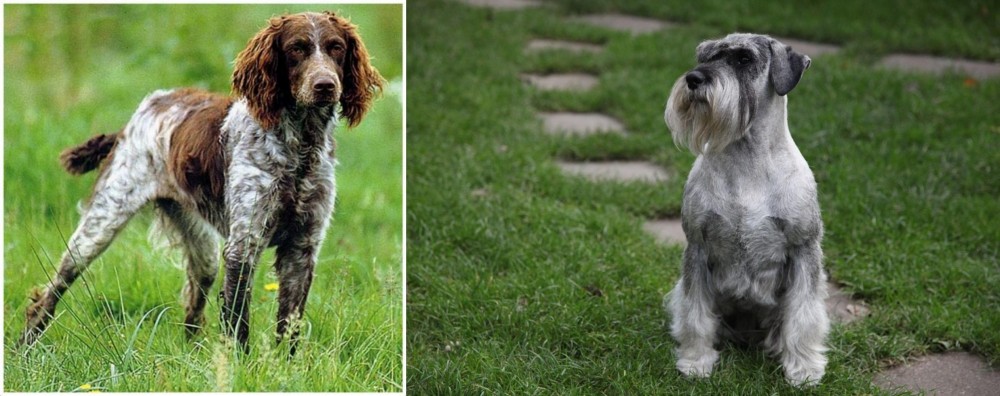 Pont-Audemer Spaniel is originated from France but Standard Schnauzer is originated from Germany. Pont-Audemer Spaniel may grow 7 cm / 3 inches higher than Standard Schnauzer. Both Pont-Audemer Spaniel and Standard Schnauzer are having almost same weight. Both Pont-Audemer Spaniel and Standard Schnauzer has almost same life span. Pont-Audemer Spaniel may have less litter size than Standard Schnauzer. Pont-Audemer Spaniel requires Moderate Maintenance. But Standard Schnauzer requires High Maintenance
Pont-Audemer Spaniel is originated from France but Standard Schnauzer is originated from Germany. Pont-Audemer Spaniel may grow 7 cm / 3 inches higher than Standard Schnauzer. Both Pont-Audemer Spaniel and Standard Schnauzer are having almost same weight. Both Pont-Audemer Spaniel and Standard Schnauzer has almost same life span. Pont-Audemer Spaniel may have less litter size than Standard Schnauzer. Pont-Audemer Spaniel requires Moderate Maintenance. But Standard Schnauzer requires High Maintenance
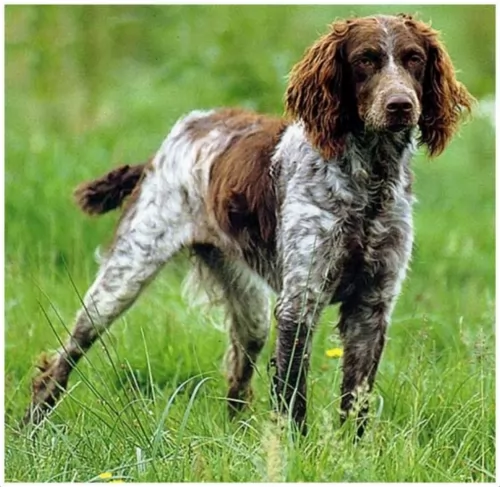 The Pont-Audemer Spaniel hails from France. The dog, known also as Epagneul Pont-Audemer is a rare breed of gun dog, and dates back to the 19th century.
The Pont-Audemer Spaniel hails from France. The dog, known also as Epagneul Pont-Audemer is a rare breed of gun dog, and dates back to the 19th century.
There aren’t clear records on the origins of the dog, but it is thought that it was developed during the 19th century. It is also thought that the dog was bred from the English Water Spaniel and the Irish Water Spaniel.
When numbers of these dogs declined, the president of the Pont-Audemer breed club permitted other breeds to be crossed with the existing gene pool. In 1980, the breed club merged with the Picardy Spaniel club and the dog is recognized by the FCI as the Pont-Audemer Spaniel.
 Coming out of Germany in the 14th and 15th century is the Standard Schnauzer or Mittelschnauzer. Both the Giant Schnauzer and Miniature Schnauzer are descendants of the Standard Schnauzer. The first name for this breed was the Wire-haired Pinscher until 1879. The breed is a working breed that is popular in Europe and was first in a dog show in 1879 in Hanover, Germany. In 1997 they won Best in Show at the Westminster Kennel Club in New York.
Coming out of Germany in the 14th and 15th century is the Standard Schnauzer or Mittelschnauzer. Both the Giant Schnauzer and Miniature Schnauzer are descendants of the Standard Schnauzer. The first name for this breed was the Wire-haired Pinscher until 1879. The breed is a working breed that is popular in Europe and was first in a dog show in 1879 in Hanover, Germany. In 1997 they won Best in Show at the Westminster Kennel Club in New York.
These medium size Schnauzers were bred in the Middle Ages to be versatile in working and herding in Germany. There seems to be artwork from the 14th through the 16th centuries featuring this breed of dog as a hunter. It is believed that the common ancestors of the Standard Schnauzer is the German Pinscher and the gray Wolf Spitz, along with the black German Poodle and the Bolognese.
It was 1850 when the breed gained recognition as a purebred with distinct and recognizable features. Those are not all the same features that the dogs of today show. These dogs had thick hair on their face, a double coat that is wiry, and their tails were cropped. These dogs were initially Wire-haired German Pinscher then in 1879, a dog named Schnauzer won Best in Show in Hanover. By 1900, the breed was being called Schnauzer everywhere.
The first breed standard was written under the Wire-haired German Pinscher name in the early 1880’s. This standard allowed for a lot of different colors, but the salt and pepper of today was not introduced until the late 1800’s. Then the standard was rewritten in 1907 for the Standard Schnauzer with this as the dominant color.
The first official Standard Schnauzer imported to the United States came in 1905 even though there is a claim that one competed in the 1899 Westminster Kennel Club in the Miscellaneous Class. Following the first World War, the breed became increasingly popular in the States. At that time the US club was called the Wire-haired Pinscher Club of America in 1925. Both standard and miniature sized schnauzer are included in this club.
The breeds were separated in 1933 and became the Standard Schnauzer Club of America and classified by the American Kennel Club as part of the Working Group. In 1926 they moved the Standard Schnauzer to the Terrier Group. By 1926 the Schnauzer Club of Great Britain was formed.
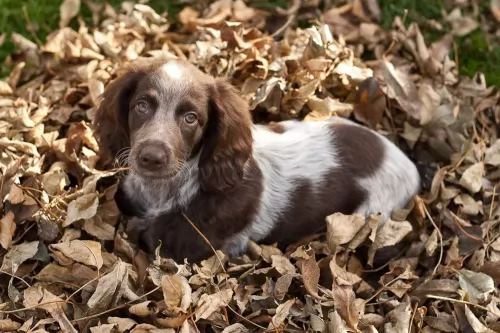 The Pont Audemer Spaniel is a medium- to large-sized breed, standing at between 50 and 58cm in height and weighing in the region of 20 – 27kg, the Pont Audemer Spaniel has a wavy, slightly curly coat of medium length, with some long hair on the top of his head. Common coat colors include white and reddish brown although there are some solid colors too. Te Muzzle of the dog is longish and fairly pointed, the nose brown and they eyes amber or hazel. This is a deep chested dog and wile the tail is traditionally docked, these days it tends to be left long and carried with a slight curve.
The Pont Audemer Spaniel is a medium- to large-sized breed, standing at between 50 and 58cm in height and weighing in the region of 20 – 27kg, the Pont Audemer Spaniel has a wavy, slightly curly coat of medium length, with some long hair on the top of his head. Common coat colors include white and reddish brown although there are some solid colors too. Te Muzzle of the dog is longish and fairly pointed, the nose brown and they eyes amber or hazel. This is a deep chested dog and wile the tail is traditionally docked, these days it tends to be left long and carried with a slight curve.
The Pont Audemer Spaniel is an intelligent dog that will respond well to training. Training and socialization are important for making him well-rounded and obedient. This spaniel-type dog just loves having loads of fun, even to the extent of being clownish.
Because he is a working dog, and an energetic one at that, he wouldn’t do well in a tiny city property but is better suited to life in the suburbs or the countryside. He is a playful dog and will get on well with children. He can also make a great friend of other dogs, particularly if he grew up with them.
 Today’s Standard Schnauzer is a square, robust, medium sized dog. The breed boasts heavy eyebrows and thick beards. They are salt and pepper or black and their coat is wiry and stiff. The breed have excellent muscle tone and a body in proportion height to length. Their build is rugged, and coat is dense.
Today’s Standard Schnauzer is a square, robust, medium sized dog. The breed boasts heavy eyebrows and thick beards. They are salt and pepper or black and their coat is wiry and stiff. The breed have excellent muscle tone and a body in proportion height to length. Their build is rugged, and coat is dense.
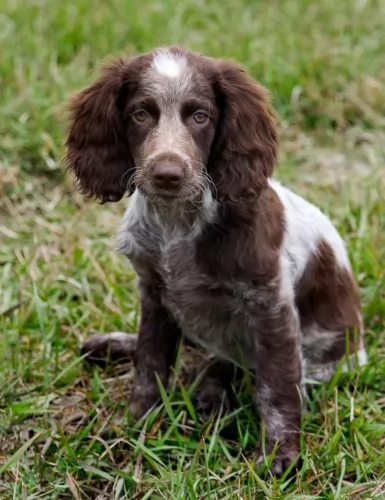 This is truly an old breed of spaniel, loving to spend time outdoors and in marshy areas.
This is truly an old breed of spaniel, loving to spend time outdoors and in marshy areas.
He is a calm, gentle breed, and passionate breeders have worked to preserve it as the dog makes a splendid pet. With an amicable look on his face which has a kind expression, he has other good characteristics to his name such as being intelligent, courageous and energetic.
Whether you’re indoors or out, the Pont-Audemer spaniel is a great companion thanks to his loyalty. Your docile, affectionate and cheerful friend will ensure you tick him off as a pet to be recommended.
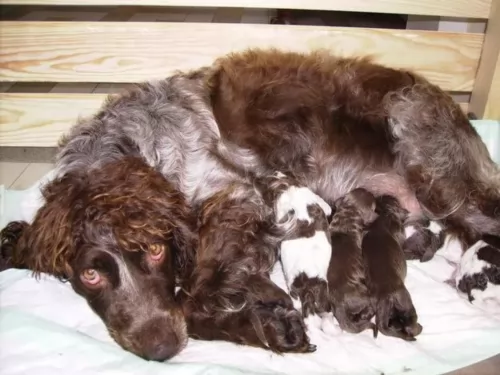 There isn’t a great deal of information on this dog as it is a fairly uncommon breed, but nonetheless a robust dog breed. He can reach 14 years or more if well cared for.
There isn’t a great deal of information on this dog as it is a fairly uncommon breed, but nonetheless a robust dog breed. He can reach 14 years or more if well cared for.
Their long, floppy ears may be a problem as dogs with long ears like this, where sunlight and air don’t reach the insides of the ear, are more prone to dampness, dirt and wax. The inside of the ears becomes a breeding place for bacteria.
It is the deep chest of the Pont-Audemer Spaniel that can put him at risk for developing bloat. When a dog like this becomes bloated you can actually see the swollen, hard stomach. The dog is extremely restless, he is panting and pacing. Immediate veterinary attention is required as this is a life threatening illness.
Known also as alopecia, there are a few things that can cause your pet to lose his hair. These can be hormonal issues or parasites such as worms.
 There are a couple of major hereditary health issues faced by the Standard Schnauzer.
There are a couple of major hereditary health issues faced by the Standard Schnauzer.
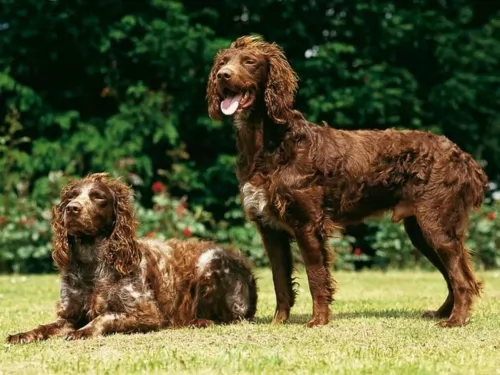 The Pont-Audemer Spaniel has always been a working breed so he is used to being active. They have high exercise requirements and will require having quite a large outdoor space to run. Ball and rope games are a must for him, lots of swimming and hikes as well as a daily walk.
The Pont-Audemer Spaniel has always been a working breed so he is used to being active. They have high exercise requirements and will require having quite a large outdoor space to run. Ball and rope games are a must for him, lots of swimming and hikes as well as a daily walk.
Even though the fairly long hair of the spaniel looks as though it may require quite a bit of upkeep, the Pont Audemer Spaniel is a low maintenance dog that will require a good brush twice a week.
While you’re brushing him, feel him over for any new, unusual lumps. Look into his eyes to make sure they’re bright and alert. Check around his ears for ticks and fleas and look inside his ears for dirt and wax which could lead to bacteria and an ear infection.
You don’t want your dog gaining weight and becoming obese as this opens up a whole lot of health issues. There are always dogs that can gain weight after they have been spayed or neutered. Remember if you’re using commercially manufactured dog food, to make sure it is high quality and also suited to your dog’s age, it’s season of life and its activity levels.
Give your canine friend some home-made food too, bearing in mind that dogs like simple, healthy food that won’t upset their stomachs, and which will be good for them too.
Boiled chicken, brown rice or pasta, sweet potatoes, carrots and spinach all chopped up can be so beneficial for your pet. If you cook it in bulk, it can be put into portions and some of this can be added into the dry kibble occasionally. This is a great treat for your dog.
Some raw meat added in from time to time can also be hugely benefit for your pet. Avoid all spicy, exotic foods for your pet.
Make sure he always has a bowl of fresh, cool water available to him.
 1Feeding the puppy: At 8-12 weeks feed four times a day. At 3 to 6 months feed three times a day. At 6 to 12 months feed twice a day.
1Feeding the puppy: At 8-12 weeks feed four times a day. At 3 to 6 months feed three times a day. At 6 to 12 months feed twice a day.
4. Games and Exercises – The breed is extremely athletic and needs daily exercise. They are playful with dogs and people and they are family dogs. They want to go wherever you go. Hiking, running, jogging and organized activities.
They are great at obedience, agility, flyball, disc dog, herding and tracking. They have also been involved in search and rescue, bomb detection, and cancer detection.